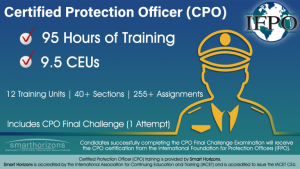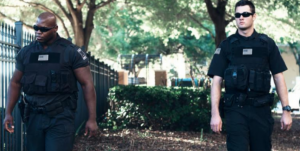Randy A. Martens is a Certified Protection Officer (CPO). We don’t know Randy but can tell you he has raised a serious issue, that many security and protection officers face day in and day out.
Randy said, “One of the leading questions asked by security professionals nationwide is, “What power do I really have?”
In all fairness, this is a legitimate question and the answer to that question is not always simplistic!
Typically, a security officer is hired to do one thing: protect people, assets, and information.
“We deter, observe, and report. Sounds simple enough, right? In most cases, the answer is, “Yes!” But what happens when it’s not that simple? What happens when someone is not cooperative with us? What happens when a crime is committed in our presence? What can we legally do about it?”
What power do I have as a security officer? The answer is none. Dial 911 for the police.
*** WANTED! *** IFPO looking for contributors for its Insights newsletter
Yes, your presence is a deterrent. Yes, you observe and report to your supervisor, the facilities manager and the police, if necessary. Yes, you get involved in issues, medical assistance, fires, assaults, thefts, slip and falls, alarms going off, bomb threats AND in addition you observe and report. When a crime is committed in your presence, you call the police! Dial 911. You may be a material witness to the incident.
These are all legitimate procedures that all security/protection officers need to discuss with their supervisors. Everyone needs to be on the same page. For example, if there is a breach of peace in the parking lot, be courteous and professionally tell them to leave. If they don’t, call the police.
Using a cellphone to call may connect you with the state police. If this happens, request to be transferred to the local police for a faster response. Why do we address this issue? It’s simple. We don’t want you to be sued in civil court for a mistake that could have been prevented.
Randy goes on to say, “In this example, I would need to question what is considered a “public offense or breach of peace.” Take the time to talk to a local attorney and your local sheriff/police departments. In the military, everything we did was with the motto of “CYA” (Cover your …)! In my personal experience, most police departments are more than willing (and even eager) to assist security officers in a quest of gaining expertise. Plus, it helps you gain rapport with your local department.”
Security/protection officers should be well-trained about powers of arrest, how to de-escalate situations and what kind of force can be used in different situations. When it comes to use of force, “the security officer is no different from a private citizen — they are confined to using only the force that is necessary to repel an attack or to protect their life or someone else’s life,” Eddie Sorrells, CPP, PCI, PSP, chief operating officer and general counsel for DSI Security Services, states in an article in Security Management magazine. He goes on to say, “responding to nonlethal situations with lethal force can be a problem, and of course security officers can be criminally liable for that and even civilly liable.”
Security/protection officers should be trained about the legal ramifications of detaining someone they believe has committed an offense. There is a legal risk when a security officer detains or attempts to detain someone without having the authority of a police officer. It’s important to remember that, in most situations, security/protection officers have the same authority as private citizens to detain someone for a crime they believe has been committed.
The bottom line is, as a security officer, you need to do your research! Find out what your state law allows/prohibits and follow it strictly. However, do not stop with just your state law. Even if your state law grants you a specific amount of leniency, that doesn’t mean that there aren’t city/town/county laws that restrict your authority. Security licensing agencies may be able to provide more information on this topic.
Security book available now: The Professional Protection Officer from the IFPO
Security companies who provide contract security and those who employ proprietary security need to ensure that their security/protection officers are well-trained and that they understand their job duties, their limitations and their rights. It is imperative that security/protection officers are well-trained, understand how to effectively respond to different situations and know the scope of their authority.
Be diligent, be safe and be a security professional!
Article prepared by Randy A. Martens, CPO; Lawrence J. Fennelly, CPOI, CSSM; Marianna Perry, M.S., CPP, CPOI
_______________________________________________________________________________________________________

Get certified and take your security career to the next level!
The International Foundation for Protection Officers (IFPO) is dedicated to providing meaningful and cost effective security training for security guards and protection officers.
We believe that education is a necessary and essential part of professional security training and the security officer’s background. IFPO serves individuals, security companies, and organizations that have their own private security staff. Our students and members benefit from the recognition and standing that the prestigious IFPO certification conveys.
LIKE and FOLLOW the IFPO on Facebook!
International Foundation for Protection Officers Mission Statement
Mission Statement Part I.
The International Foundation for Protection Officers provides professional learning opportunities for security practitioners, to impart the knowledge, skills, and competencies required to maximize job performance and enhance career potential.
Purpose: to make a positive difference in the quality of the participant’s job performance and elevate the professional status of students who partake of our learning opportunities.
Business: to supply committed security practitioners with a quality education to help achieve their highest potential and provide recognized accreditation for successful completion of educational goals.
Values: commitment, integrity, responsibility, and standards of excellence, provide the platform that supports our journey as we pursue our mission.
Vision Statement
Commitment to Excellence: To be the recognized center of excellence and primary provider of education and training products and services to the security industry.
Mission Statement Part II.
“The International Foundation for Protection Officers is committed to the support and professional development of protection officers and supervisors. Through advocacy, promoting training standards, and providing accessible training, education and certification opportunities, we seek to enhance their professional standing as well as increase and diversify the value of the vital services they provide.”


